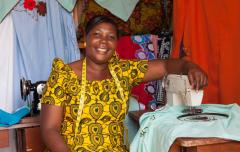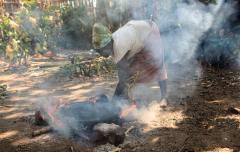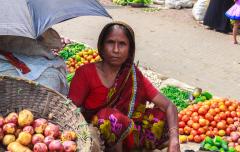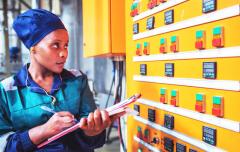Guest Blog: NGOs and tea factories team up with cooperatives and women farmers to increase access to clean cooking in Kenya
In Kenya, about 90% of the rural population relies on wood or charcoal to meet their cooking needs.1 Relying on these biomass products causes significant health and socioeconomic issues. An alternative is the improved cookstove (ICS), which enables women to gain access to cleaner energy since the stoves use less biomass and produce much less smoke than traditional stoves. These cleaner stoves also help reduce poverty. This is because women save time collecting firewood, thus enabling them to focus on other activities such as education—for themselves and their children—and generating income.
Practical Action and SCODE’s business model
ENERGIA’s partners in Kenya, Practical Action and SCODE, are working with over 700 women energy entrepreneurs to increase their participation in various renewable energy value chains, including ICS, to deliver energy services to so-called ‘last mile’ users. The partners have figured out an effective—and likely replicable and scalable—approach to reach rural farmers and their households with improved cookstoves, while at the same time unlocking the potential of women-led energy enterprises. Practical Action and SCODE have partnered with five tea factories and their associated cooperative societies of tea farmers2 to increase access to ICS through flexible user financing options. John Maina, SCODE’s Director, explains the collaboration in more detail.
“Together with the tea cooperative societies, we identify promising women energy entrepreneurs from the Women in Energy Enterprises in Kenya (WEEK)3 project, and male farmers, who want to promote the use and sale of ICS to others in the surrounding tea farmer communities. The tea farmers at each of the five tea factories represent 5,000-8,000 households, or 25,000-40,000 individuals (based on an average family size of 5). We have noticed that women in particular, who often work as tea pickers, perform really well in promoting and selling ICS with other women, as they are the ones responsible for cooking in the households. Orders for the ICS are received and vetted by the cooperative societies and then forwarded to SCODE for fulfilment. The cooperative societies deduct the amount for the ICS from a farmer’s earnings either in a lump sum or instalments, based on an individual’s capacity to pay. The entrepreneurs promoting and selling the cookstoves are then compensated according to their sales performance. The tea factories are very supportive of this arrangement because reducing the environmental impact of cutting trees for firewood is one of the prerequisites to obtaining the Fairtrade and Rainforest certifications of the tea products. The certifications entail that the tea can be sold at premium prices in the tea auction market. So, the partnership is a win-win-win-win for everyone involved—tea farmers, tea factories, the cooperative societies and for SCODE’s social enterprise.”
Tabitha Njoki Kabia is one of five women who was identified to promote and sell the cookstoves. She works for the Chinga Tea Factory in Nyeri in Central Kenya, and when she learned about the more energy-efficient stoves, she instantly knew she would make it her future business. Practical Action and SCODE invited her to participate in one of the Women in Energy Enterprises in Kenya (WEEK) project training sessions, supported by ENERGIA. She applied the business skills that she learned and has been busy selling cookstoves and encouraging other women to do the same to earn additional incomes. Since the WEEK project training just over a year ago, she has sold more than 3,500 cookstoves to fellow tea farmers. Kabia and others like her clearly illustrates the direct impact one person can have on expanding communities’ access to cleaner energy.
Challenges in financing energy access
Business is not business without a challenge, and the main constraint facing SCODE’s social enterprise is one that many social enterprises confront: financing. As Maina points out, “tea farmers are only paid twice a year in lump sums (with a small bonus at another time in the year)4, meaning that SCODE must use its own funds to cover the provisional gap until they receive payment for the stoves that have been sold. This money is always repaid in full, thanks to working through the cooperative societies and its flexible payment terms.
External financing, however, would enable SCODE to better regulate cash flows throughout the year and enable it to scale up production and sales of ICS to its 2018 target of an additional 20 trained ICS entrepreneurs and 10 more tea factories and cooperatives, substantially increasing access to cleaner energy for tea farming populations in Kenya. But external financing is not easy to secure, as Sustainable Energy for All (SEforALL) highlights in its recent Energizing Finance report. In her foreword to the report, Rachel Kyte, CEO of SEforALL, mentions that, “global finance flows towards clean cooking access were shockingly low. Annual finance commitments that were tracked totaled about $32 million a year, compared to estimated annual investment needs of USD $4.4 billion.” As Kyte goes on to say: “We’re nowhere near where we need to be.”5
That being said, there is great potential for SCODE and for other social enterprises in Kenya to continue their activities and replicate the same core business model in other industries. In fact, Maina believes the model can be replicated and scaled faster, for instance, in the dairy, coffee and flower industries since they share similar characteristics. “There are huge workforces in these three industries, and dairy, flower and coffee farmers also belong to cooperatives,” Maina says, adding, “in contrast to the tea industry, they are paid on a monthly basis. Moreover, the Fairtrade and Rainforest certifications are also motivating factors in these industries, particularly coffee and flower which are major exports.”
It is critical to recognize that the potential for increasing clean energy access is abundant. It’s been proven by SCODE, despite challenges. These opportunities, if supported with financing, could empower more farmers, especially women, as entrepreneurs to deliver cleaner energy to the last mile. Echoing Kyte in the Energizing Finance report, there is a clear need for a “frank new dialogue around bold market-based strategies that can deploy clean fuels and technologies for cooking, rapidly and at the required scale. If this does not happen, the millions of women and children who suffer and die every year from dirty cooking fuels will not diminish.”6
ENERGIA is a partner of Sustainable Energy for All’s People-Centered Accelerator.
1 Sustainable Energy for All. 2017. Energizing Finance: Scaling and Refining Finance in Countries with Large Energy Access Gaps, Table 5, pg. 37.
2 Tea farmers in Kenya are obliged to be part of a cooperative society. The cooperative society sells the tea products in local and international markets and handles the payments to farmers from the tea factories.
3 The project is a deliberate effort supported by ENERGIA in seven counties in Kenya to address the challenges that women entrepreneurs face as actors in energy markets.
4 Changing this payment system requires government intervention.
5 Sustainable Energy for All. 2017. Energizing Finance: Scaling and Refining Finance in Countries with Large Energy Access Gaps, p.5.
5 Ibid.



